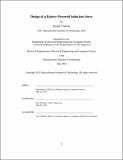| dc.contributor.advisor | Rich Fletcher. | en_US |
| dc.contributor.author | Weber, Daniel J., M. Eng. Massachusetts Institute of Technology | en_US |
| dc.contributor.other | Massachusetts Institute of Technology. Department of Electrical Engineering and Computer Science. | en_US |
| dc.date.accessioned | 2016-01-04T19:59:13Z | |
| dc.date.available | 2016-01-04T19:59:13Z | |
| dc.date.copyright | 2015 | en_US |
| dc.date.issued | 2015 | en_US |
| dc.identifier.uri | http://hdl.handle.net/1721.1/100618 | |
| dc.description | Thesis: M. Eng., Massachusetts Institute of Technology, Department of Electrical Engineering and Computer Science, 2015. | en_US |
| dc.description | This electronic version was submitted by the student author. The certified thesis is available in the Institute Archives and Special Collections. | en_US |
| dc.description | Cataloged from student-submitted PDF version of thesis. | en_US |
| dc.description | Includes bibliographical references (pages 52-53). | en_US |
| dc.description.abstract | Many people in the developing areas of the world struggle to cook with stoves that emit hazardous fumes and contribute to green house gas emissions. Electric stoves would alleviate many of these issues, but significant barriers to adoption, most notably lack of reliable electric power, make current commercial options infeasible. However, a stove with an input power of 24V DC elegantly solves the issue of intermittent power by allowing car batteries to be used instead of a grid connection, while also allowing seamless integration with small scale solar installations and solar-based micro-grids. However, no existing commercial stoves nor academic research have attempted to create an induction stove powered from a low voltage DC source. This paper presents the design of a low voltage current-fed, full-bridge parallel resonant converter stove. The dynamics of this new topology are discussed in detail and simulations are provided to analyze the behavior. Additionally, a practical implementation of a 500W - 1 kW stove is described. This stove is the first of it's kind and represents a new contribution to both the field of induction cooking and the field of clean cooking solutions for the developing world. | en_US |
| dc.description.statementofresponsibility | by Daniel J. Weber. | en_US |
| dc.format.extent | 53 pages | en_US |
| dc.language.iso | eng | en_US |
| dc.publisher | Massachusetts Institute of Technology | en_US |
| dc.rights | M.I.T. theses are protected by copyright. They may be viewed from this source for any purpose, but reproduction or distribution in any format is prohibited without written permission. See provided URL for inquiries about permission. | en_US |
| dc.rights.uri | http://dspace.mit.edu/handle/1721.1/7582 | en_US |
| dc.subject | Electrical Engineering and Computer Science. | en_US |
| dc.title | Design of a battery-powered induction stove | en_US |
| dc.type | Thesis | en_US |
| dc.description.degree | M. Eng. | en_US |
| dc.contributor.department | Massachusetts Institute of Technology. Department of Electrical Engineering and Computer Science | |
| dc.identifier.oclc | 932637869 | en_US |
